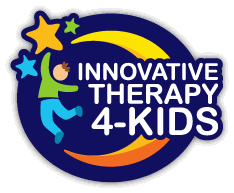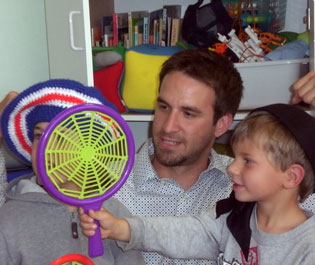What exactly is a Speech Pathologist?
A Speech Pathologist, also known as an SLP, has advanced training in assessing, diagnosing, treating, and helping prevent disorders related to speech, language, social skills, cognitive-communication, voice, feeding, swallowing, and language fluency as well as specialized training in sensory integration and primitive reflexes.
Why would your child need Speech Therapy?
IT4K’s Speech-Language Pathologists (SLPs or STs) work specifically with adults & children who cannot produce speech sounds or cannot produce them clearly; have speech rhythm and fluency problems such as stuttering; voice disorders such as inappropriate volume, pitch, or harsh voice; problems understanding and producing language; and those with cognitive communication impairments such as attention, memory, and problem-solving disorders. SLPs / STs also work with people who have feeding, swallowing, tongue thrust, TMJ, and auditory processing difficulties.
What is a Receptive Language Disorder?
Receptive Language includes the skills involved in understanding language. Receptive Language Disorders are difficulties in the ability to attend to, process, comprehend, and/or retain spoken language.
What are signs of a Receptive Language Disorder?
- Difficulty Following Directions
- Repeating Back Words or Phrases Either Immediately or at a Later Time (Echolalia)
- Difficulty Answering Questions Appropriately
- Use of Jargon While Talking
- Difficulty Attending to Spoken Language
- High Activity Level When Listening
- Inappropriate and/or Off Topic Responses to Questions
- Answering Only Portions of a Question
What is an Expressive Language Disorder?
Expressive Language includes the skills involved in communicating one’s thoughts and feelings to others. An Expressive Language Disorder concerns difficultly with verbal expression.
What are signs of an Expressive Language Disorder?
Some signs and symptoms of an Expressive Language Disorder include:
- Omitting word endings, difficulty acquiring forms such as plurals, past tense and present tense verbs, etc.
- Premature Sentence Length & Structure
- Limited Vocabulary
- Repetition of Words or Syllables
- Difficulty understanding words that describe position, time, quality or quantity.
- Word retrieval difficulties
- Substituting one word for another or misnaming items.
- Relying on non-verbal or limited means of communicating.
- Difficulty Using Pronouns Correctly
What is an Articulation Disorder?
Articulation is the production of speech sounds. An Articulation Disorder is when a child does not make speech sounds correctly due to premature phonological systems or incorrect placement or movement of the jaw, lips, tongue, velum, and/or pharynx. It is important to recognize that there are differences in the age at which children produce specific speech sounds in all words & phrases.
What is a Phonological Disorder?
Phonology refers to the speech sound system of language. A Phonological Disorder is when a child is not using speech sound patterns appropriately. A child whose sound structures are different from the speech typical for their stage of development, or who produces unusual simplifications of sound combinations may be demonstrating a phonological disorder.
What are some signs of a Phonological Disorder in my child?
Signs of a possible phonological disorder in a preschool child may include:
- Omits Sounds in Words
- Is Difficult to Understand
- Stops many consonants, little use of continuing consonants such as /w, s, n, f/…
- Limited Variety of Speech Sounds

 Language Groups
Language Groups